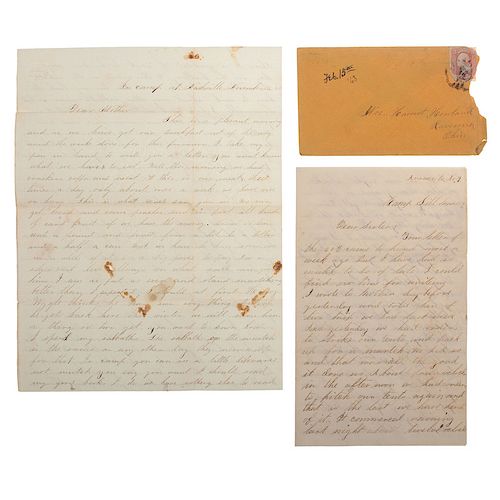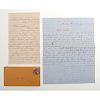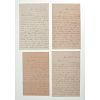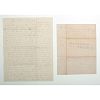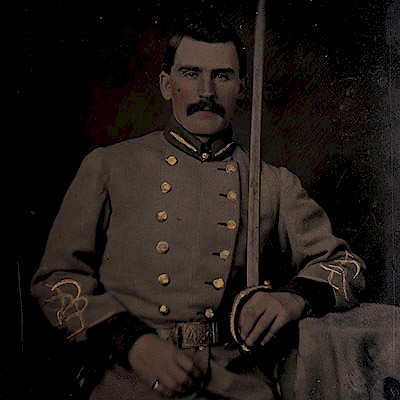Private Henry D. Isbell, Battery A, 1st Ohio Light Artillery, Civil War Archive
About Seller
6270 Este Ave.
Cincinnati , OH 45232
United States
With offices in Cincinnati, Cleveland and Denver, Cowan’s holds over 40 auctions each year, with annual sales exceeding $16M. We reach buyers around the globe, and take pride in our reputation for integrity, customer service and great results. A full-service house, Cowan’s Auctions specializes in Am...Read more
Two ways to bid:
- Leave a max absentee bid and the platform will bid on your behalf up to your maximum bid during the live auction.
- Bid live during the auction and your bids will be submitted real-time to the auctioneer.
Bid Increments
| Price | Bid Increment |
|---|---|
| $0 | $25 |
| $500 | $50 |
| $1,000 | $100 |
| $2,000 | $250 |
| $5,000 | $500 |
| $10,000 | $1,000 |
| $20,000 | $2,500 |
| $50,000 | $5,000 |
| $100,000 | $10,000 |
About Auction
Jun 22, 2018
Cowan’s American History: Premier Auction, scheduled for June 22, 2018 is comprised of early photographs, documents, manuscripts, broadsides, flags, and more dating from the Revolutionary War, the Civil War, Late Indian Wars, World War I and II and beyond. Cowan's Auctions dawnie@cowans.com
- Lot Description
Lot of 14 war-date letters, three with original envelopes, written by Private Henry D. Isbell. Isbell (1843-183) was born in the rural farming community of Portage County, OH, to Robert Isbell and Charlotte Taylor Isbell. He enlisted as a private for three years' service on 8/7/62 and mustered into Battery A of the 1st Ohio Light Artillery. Letters span September 1862-September 1863 and are written to his father and mother, as well as to his sister Harriet Isbell Howland (1833-1905) and her husband John P. Howland (1828-1902).
In August and September 1862, just after Henry Isbell enlisted, Battery A of the 1st Ohio Light Artillery was on its way to Louisville, KY, in pursuit of Confederate General Bragg. Isbell's first letter in this collection is written on September 6, 1862, from "New Parks Barrks, Louisville" to his brother-in-law John Howland. Isbell is very satisfied with his new barracks which he notes are much better than his old ones. He notes that he has a fine place to drill, he drills three times a day, and that his squad "is the best one in the field." Isbell also shares with his brother-in-law the exciting news that Confederate Raider John Hunt Morgan is in the area: "Morgan took a place called Brandon night before last about twenty-five miles south of here on the rail rode so our communications with the boys is cut off for the present...There is a great deal of excitement here Morgan is reported within twenty miles of here and every one thinks he will take the place with in a week. I hope he will. It is full of secesh."
After a march to Nashville, the 1st Ohio Light Artillery was reviewed by General Rosecrans, who Isbell describes in a letter of November 15, 1862, as "a fine looking man and a fighting one two...." Rosecrans and Isbell's 1st LA were just weeks away from a major engagement, the Battle of Stones River which was fought December 31, 1862, through January 2, 1863. In this, one of the deadliest battles of the Civil War, Private Henry Isbell would experience fierce fighting. Writing to his sister from Camp Sill [Murfreesboro, TN] on February 15, 1863, he describes the battle saying, "Every gun had left the park before we had started our ceysone and then we stopped out in the open field and was going to hitch our horse on but we could not for they [the Rebels] were within six nods of us and we could not hold our horse after my horse was shot I went to the gun but it had gon up for most of the horses was shot and there was no one there but Lieut. C [Charles S. Cotter] and L.[ucias] Coe, John Whitney and one other canoneer...then I went with Lieut. C. to Dick Rogers brass guns and we went to working it as fast as we could, but the horse got shot and the limbe nocked to peaces and we had to leave it..."
After Stones River Isbell moved to Camp Drake but remained at Murfreesboro until June. His many letters home during this extended period of encampment reflect both his contentment with a soldier's life, as well as impatience with the monotony that comes with it. He tells his mother in mid-April that "...if I live to get home I don't think it will be before my three years are up. I don't see as our armies are doing anything and if they can't move mutch...I am good for my three years." To his father, he writes "I like soldiering very well when it is dry and not too hot," and then later that month that "Everything is about the the same in the battery. We are all well but we want to get out of this place we have been here long enough it is to mutch of one thing." By May, however, Isbell is growing confident that a move is coming, and that difficult battles lie ahead. Writing again to his father while "On Picket on the Salers Pike, May 2, 1863," Isbell writes that "We came out here on picket...I like it much better than in camp...The news came from camp today that we was going to martch in a few days...If we move up we shall have some hard fighting in a few days. I would think it was about time for some one to do something...I see by the papers...that our troops are moving all around. I hope they will try and whip the rebs this summer..."
The march did not come in May as Isbell anticipated, and the waiting and ongoing conflict take a toll on the soldiers. Still in Murfreesboro on May 22, Isbell tells his sister that "One day we have good news and the boys are in fine spirits the next it is as dark as ever and every one goes about his work with a long face on but I hope our arms will do some thing in the west this summer and I think they will but I don't think we can take Richmond. I see by the papers today that Hooker is on his way to Washington with his army. I hope he will get whipped out of there and drove out of the state and then see if they [the Rebels] will know and acknowledge to the country that they are whipped..."
Finally on the move, Isbell relocates with the 1st LA to Nashville as part of the occupation of middle Tennessee, and then makes the move into Georgia as part of the Chickmauga Campaign. The last letter in this collection was written by Isbell on September 11, 1863, to his mother from "Camp between Lookout and Bear Mountain." One week before the Battle of Chickmauga, Henry hastily informs his mother that "We have marched about twenty five miles since I wrote to father and we came twenty of it yesterday the wether is very hot and the dust is about a foot deep. I shall have to write you a short letter this time but I thought you would like to know where we was and that we are all well."
The Battle of Chickamauga would be Private Isbell's last. He was wounded there on September 19, 1863, and died of those wounds approximately one month later on October 16, 1863. He is buried in Freedom West Cemetery in Portage County, OH.
The letters in the collection are of various sizes, and all are in generally good condition. Three letters come with the original stamped transmittal cover.
Eliminate the Hassle of Third-Party Shippers: Let Cowan's Ship Directly To You!Condition
If you'd like a shipping estimate before the auction, contact Cowan's in-house shipping department at shipping@cowans.com or 513.871.1670 x219. - Shipping Info
-
Buyers are required to pay for all packing, shipping and insurance charges. Overseas duty charges are the responsibility of the successful Bidder. Be aware that for larger and/or valuable items, shipping charges can be substantial. - If there is no shipping amount on listed your invoice, you will need to make arrangements to pick up or ship your purchase through an alternative shipping company. Our shipping department can be contacted at 513.871.1670 (ext. 219) or email shipping@cowans.com. - Shipping charges include insurance for your order while in transit. If you have private insurance we will adjust your charge to include only packing and shipping. - Please allow 14 – 21 days after payment to package and ship your purchase as carefully as possible.
-
- Buyer's Premium



 EUR
EUR CAD
CAD AUD
AUD GBP
GBP MXN
MXN HKD
HKD CNY
CNY MYR
MYR SEK
SEK SGD
SGD CHF
CHF THB
THB